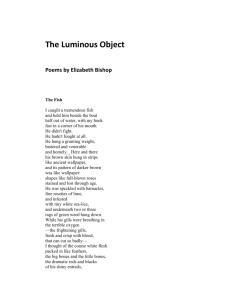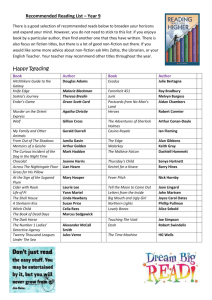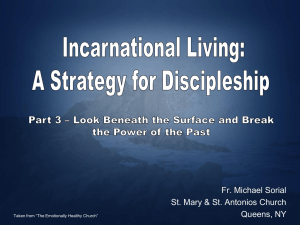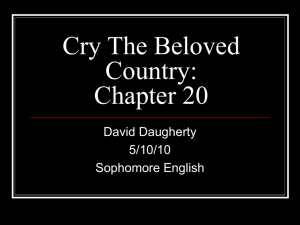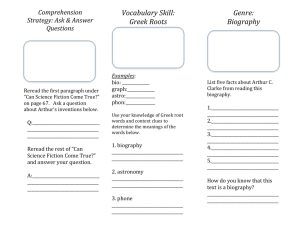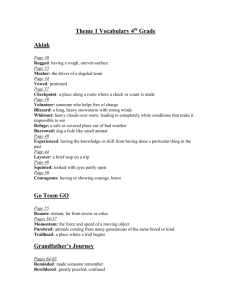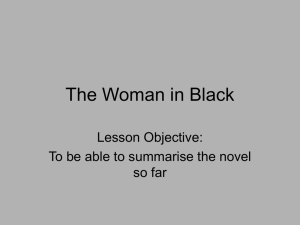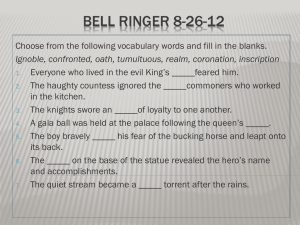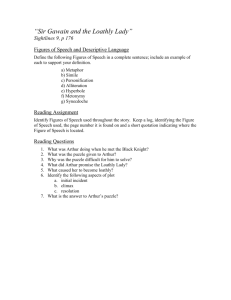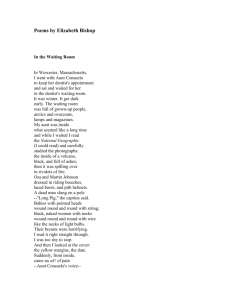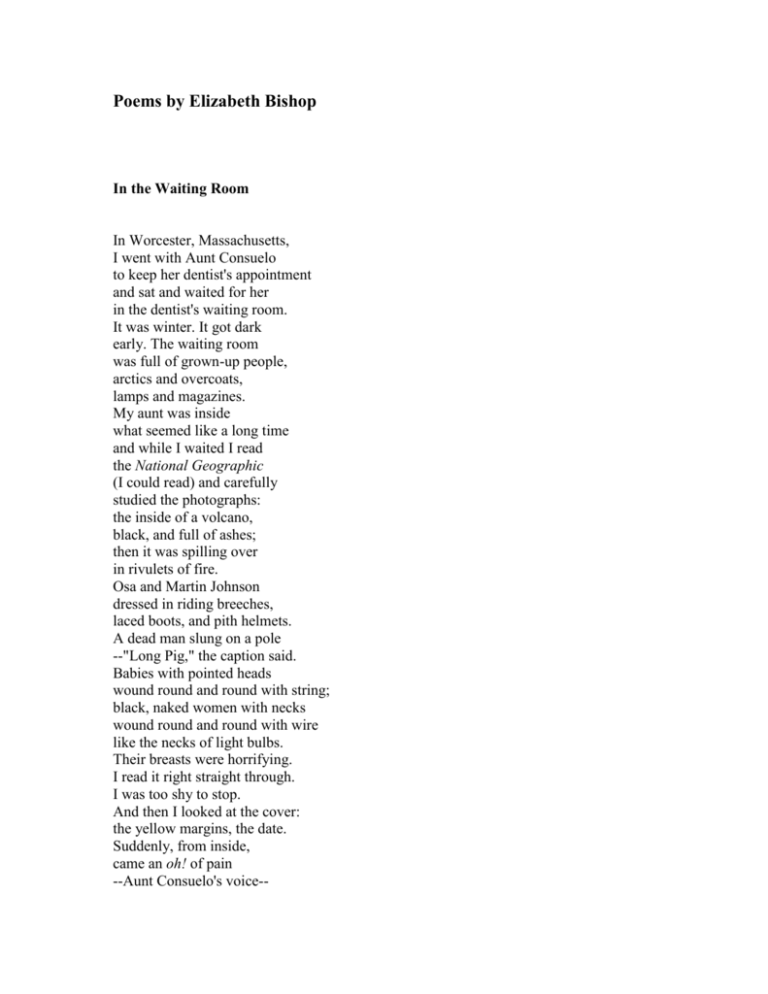
Poems by Elizabeth Bishop
In the Waiting Room
In Worcester, Massachusetts,
I went with Aunt Consuelo
to keep her dentist's appointment
and sat and waited for her
in the dentist's waiting room.
It was winter. It got dark
early. The waiting room
was full of grown-up people,
arctics and overcoats,
lamps and magazines.
My aunt was inside
what seemed like a long time
and while I waited I read
the National Geographic
(I could read) and carefully
studied the photographs:
the inside of a volcano,
black, and full of ashes;
then it was spilling over
in rivulets of fire.
Osa and Martin Johnson
dressed in riding breeches,
laced boots, and pith helmets.
A dead man slung on a pole
--"Long Pig," the caption said.
Babies with pointed heads
wound round and round with string;
black, naked women with necks
wound round and round with wire
like the necks of light bulbs.
Their breasts were horrifying.
I read it right straight through.
I was too shy to stop.
And then I looked at the cover:
the yellow margins, the date.
Suddenly, from inside,
came an oh! of pain
--Aunt Consuelo's voice--
not very loud or long.
I wasn't at all surprised;
even then I knew she was
a foolish, timid woman.
I might have been embarrassed,
but wasn't. What took me
completely by surprise
was that it was me:
my voice, in my mouth.
Without thinking at all
I was my foolish aunt,
I--we--were falling, falling,
our eyes glued to the cover
of the National Geographic,
February, 1918.
I said to myself: three days
and you'll be seven years old.
I was saying it to stop
the sensation of falling off
the round, turning world.
into cold, blue-black space.
But I felt: you are an I,
you are an Elizabeth,
you are one of them.
Why should you be one, too?
I scarcely dared to look
to see what it was I was.
I gave a sidelong glance
--I couldn't look any higher-at shadowy gray knees,
trousers and skirts and boots
and different pairs of hands
lying under the lamps.
I knew that nothing stranger
had ever happened, that nothing
stranger could ever happen.
Why should I be my aunt,
or me, or anyone?
What similarities-boots, hands, the family voice
I felt in my throat, or even
the National Geographic
and those awful hanging breasts-held us all together
2
or made us all just one?
How--I didn't know any
word for it--how "unlikely". . .
How had I come to be here,
like them, and overhear
a cry of pain that could have
got loud and worse but hadn't?
The waiting room was bright
and too hot. It was sliding
beneath a big black wave,
another, and another.
Then I was back in it.
The War was on. Outside,
in Worcester, Massachusetts,
were night and slush and cold,
and it was still the fifth
of February, 1918.
The Fish
I caught a tremendous fish
and held him beside the boat
half out of water, with my hook
fast in a corner of his mouth.
He didn't fight.
He hadn't fought at all.
He hung a grunting weight,
battered and venerable
and homely. Here and there
his brown skin hung in strips
like ancient wallpaper,
and its pattern of darker brown
was like wallpaper:
shapes like full-blown roses
stained and lost through age.
He was speckled with barnacles,
fine rosettes of lime,
and infested
with tiny white sea-lice,
and underneath two or three
3
rags of green weed hung down.
While his gills were breathing in
the terrible oxygen
--the frightening gills,
fresh and crisp with blood,
that can cut so badly-I thought of the coarse white flesh
packed in like feathers,
the big bones and the little bones,
the dramatic reds and blacks
of his shiny entrails,
and the pink swim-bladder
like a big peony.
I looked into his eyes
which were far larger than mine
but shallower, and yellowed,
the irises backed and packed
with tarnished tinfoil
seen through the lenses
of old scratched isinglass.
They shifted a little, but not
to return my stare.
--It was more like the tipping
of an object toward the light.
I admired his sullen face,
the mechanism of his jaw,
and then I saw
that from his lower lip
--if you could call it a lip
grim, wet, and weaponlike,
hung five old pieces of fish-line,
or four and a wire leader
with the swivel still attached,
with all their five big hooks
grown firmly in his mouth.
A green line, frayed at the end
where he broke it, two heavier lines,
and a fine black thread
still crimped from the strain and snap
when it broke and he got away.
Like medals with their ribbons
frayed and wavering,
a five-haired beard of wisdom
trailing from his aching jaw.
I stared and stared
and victory filled up
4
the little rented boat,
from the pool of bilge
where oil had spread a rainbow
around the rusted engine
to the bailer rusted orange,
the sun-cracked thwarts,
the oarlocks on their strings,
the gunnels--until everything
was rainbow, rainbow, rainbow!
And I let the fish go.
First Death in Nova Scotia
In the cold, cold parlor
my mother laid out Arthur
beneath the chromographs:
Edward, Prince of Wales,
with Princess Alexandra,
and King George with Queen Mary.
Below them on the table
stood a stuffed loon
shot and stuffed by Uncle
Arthur, Arthur's father.
Since Uncle Arthur fired
a bullet into him,
he hadn't said a word.
He kept his own counsel
on his white, frozen lake,
the marble-topped table.
His breast was deep and white,
cold and caressable;
his eyes were red glass,
much to be desired.
"Come," said my mother,
"Come and say good-bye
to your little cousin Arthur."
I was lifted up and given
one lily of the valley
to put in Arthur's hand.
5
Arthur's coffin was
a little frosted cake,
and the red-eyed loon eyed it
from his white, frozen lake.
Arthur was very small.
He was all white, like a doll
that hadn't been painted yet.
Jack Frost had started to paint him
the way he always painted
the Maple Leaf (Forever).
He had just begun on his hair,
a few red strokes, and then
Jack Frost had dropped the brush
and left him white, forever.
The gracious royal couples
were warm in red and ermine;
their feet were well wrapped up
in the ladies' ermine trains.
They invited Arthur to be
the smallest page at court.
But how could Arthur go,
clutching his tiny lily,
with his eyes shut up so tight
and the roads deep in snow?
The Imaginary Iceberg
We'd rather have the iceberg than the ship,
although it meant the end of travel.
Although it stood stock-still like cloudy rock
and all the sea were moving marble.
We'd rather have the iceberg than the ship;
we'd rather own this breathing plain of snow
though the ship's sails were laid upon the sea
as the snow lies undissolved upon the water.
O solemn, floating field,
are you aware an iceberg takes repose
with you, and when it wakes may pasture on your snows?
This is a scene a sailor'd give his eyes for.
6
The ship's ignored. The iceberg rises
and sinks again; its glassy pinnacles
correct elliptics in the sky.
This is a scene where he who treads the boards
is artlessly rhetorical. The curtain
is light enough to rise on finest ropes
that airy twists of snow provide.
The wits of these white peaks
spar with the sun. Its weight the iceberg dares
upon a shifting stage and stands and stares.
The iceberg cuts its facets from within.
Like jewelry from a grave
it saves itself perpetually and adorns
only itself, perhaps the snows
which so surprise us lying on the sea.
Good-bye, we say, good-bye, the ship steers off
where waves give in to one another's waves
and clouds run in a warmer sky.
Icebergs behoove the soul
(both being self-made from elements least visible)
to see them so: fleshed, fair, erected indivisible.
Giant Snail
The rain has stopped. The waterfall will roar like that all night. I have come out to take a walk and
feed. My body--foot, that is--is wet and cold and covered with sharp gravel. It is white, the size of a
dinner plate. I have set myself a goal, a certain rock, but it may well be dawn before I get there.
Although I move ghostlike and my floating edges barely graze the ground, I am heavy, heavy, heavy.
My white muscles are already tired. I give the impression of mysterious ease, but it is only with the
greatest effort of my will that I can rise above the smallest stones and sticks. And I must not let myself
be distracted by those rough spears of grass. Don't touch them. Draw back. Withdrawal is always best.
The rain has stopped. The waterfall makes such a noise! (And what if I fall over it?) The mountains
of black rock give off such clouds of steam! Shiny streamers are hanging down their sides. When this
occurs, we have a saying that the Snail Gods have come down in haste. I could never descend such
steep escarpments, much less dream of climbing them.
That toad was too big, too, like me. His eyes beseeched my love. Our proportions horrify our
neighbors.
Rest a minute; relax. Flattened to the ground, my body is like a pallid, decomposing leaf. What's
that tapping on my shell? Nothing. Let's go on.
My sides move in rhythmic waves, just off the ground, from front to back, the wake of a ship, waxwhite water, or a slowly melting floe. I am cold, cold, cold as ice. My blind, white bull's head was a
7
Cretan scare-head; degenerate, my four horns that can't attack. The sides of my mouth are now my
hands. They press the earth and suck it hard. Ah, but I know my shell is beautiful, and high, and
glazed, and shining. I know it well, although I have not seen it. Its curled white lip is of the finest
enamel. Inside, it is as smooth as silk, and I, I fill it to perfection.
My wide wake shines, now it is growing dark. I leave a lovely opalescent ribbon: I know this.
But O! I am too big. I feel it. Pity me.
If and when I reach the rock, I shall go into a certain crack there for the night. The waterfall below
will vibrate through my shell and body all night long. In that steady pulsing I can rest. All night I shall
be like a sleeping ear.
Giant Toad
I am too big. Too big by far. Pity me.
My eyes bulge and hurt. They are my one great beauty, even so. They see too much, above, below.
And yet, there is not much to see. The rain has stopped. The mist is gathering on my skin in drops. The
drops run down my back, run from the corners of my downturned mouth, run down my sides and drip
beneath my belly. Perhaps the droplets on my mottled hide are pretty, like dewdrops, silver on a
moldering leaf? They chill me through and through. I feel my colors changing now, my pigments
gradually shudder and shift over.
Now I shall get beneath that overhanging ledge. Slowly. Hop. Two or three times more, silently.
That was too far. I'm standing up. The lichen's gray, and rough to my front feet. Get down. Turn facing
out, it's safer. Don't breathe until the snail gets by. But we go travelling the same weathers.
Swallow the air and mouthfuls of cold mist. Give voice, just once. O how it echoed from the rock!
What a profound, angelic bell I rang!
I live, I breathe, by swallowing. Once, some naughty children picked me up, me and two brothers.
They set us down again somewhere and in our mouths they put lit cigarettes. We could not help but
smoke them, to the end. I thought it was the death of me, but when I was entirely filled with smoke,
when my slack mouth was burning, and all my tripes were hot and dry, they let us go. But I was sick
for days.
I have big shoulders, like a boxer. They are not muscle, however, and their color is dark. They are
my sacs of poison, the almost unused poison that I bear, my burden and my great responsibility. Big
wings of poison, folded on my back. Beware, I am an angel in disguise; my wings are evil, but not
deadly. If I will it, the poison could break through, blue-black, and dangerous to all. Blue-black fumes
would rise upon the air. Beware, you frivolous crab.
8
12 O'Clock News
gooseneck
lamp
As you all know, tonight is the night of the full
moon, half the world over. But here the moon
seems to hang motionless in the sky. It gives very
little light; it could be dead. Visibility is poor.
Nevertheless, we shall try to give you some idea of
the lay of the land and the present situation.
typewriter
The escapement that rises abruptly from the central
plain is in heavy shadow, but the elaborate terracing of its southern glacis gleams faintly in the dim
light, like fish scales. What endless labor those
small, peculiarly shaped terraces represent! And
yet, on them the welfare of this tiny principality
depends.
pile of mss.
A slight landslide occurred in the northwest about
an hour ago. The exposed soil appears to be of poor
quality: almost white, calcareous, and shaly. There
are believed to have been no casualties.
typed sheet
Almost due north, our aerial reconnaissance reports
the discovery of a large rectangular ‘field’, hitherto
unknown to us, obviously man-made. It is darkspeckled. An airstrip? A cemetery?
envelopes
In this small, backward country, one of the most
backward left in the world today, communications
are crude and “industrialization” and its products
almost nonexistent. Strange to say, however, signboards are on a truly gigantic scale.
ink-bottle
We have also received reports of a mysterious, oddly
shaped, black structure, at an undisclosed distance
to the east. Its presence was revealed only because
its highly polished surface catches such feeble
moonlight as prevails. The natural resources of the
country being far from completely known to us,
there is the possibility that this may be, or may
contain, some powerful and terrifying “secret
weapon”. On the other hand, given what we do
know, or have learned from our anthropologists
and sociologists about this people, it may well be
nothing more than a numen, or a great altar
9
recently erected to one of their gods, to which, in
their present historical state of superstition and
helplessness, they attribute magical power, and
may even regard as a “savior,” one last hope of
rescue from their grave difficulties.
typewriter
eraser
At last! One of the elusive natives has been spotted!
He appears to be—rather, to have been—a
unicyclist-courier, who may have met his end by
falling from the height of the escarpment because
of the deceptive illumination. Alive, he would have
been small, but undoubtedly proud and erect, with
the thick, bristling black hair typical of the
indigenes.
ashtray
From our superior vantage point, we can clearly see
into a sort of dugout, possibly a shell crater, a “nest”
of soldiers. They lie heaped together, wearing the
camouflage “battle dress” intended for “winter warfare”. They are in hideously contorted position, all
dead. We can make out at least eight bodies. These
uniforms were designed to be used in guerilla
warfare on the country's one snow-covered mountain peak. The fact that these poor soldiers are
wearing them here, on the plain, gives further
proof, if proof were necessary, either of the childishness and hopeless impracticality of this inscrutable
people, our opponents, or of the sad corruption of their
leaders.
From The Complete Poems: 1927-1979 , by Elizabeth Bishop.
Copyright © 1979, 1983 by Alice Helen Methfessel.
Used by permission of Farrar, Straus and Giroux, LLC.
All rights reserved.1
10

